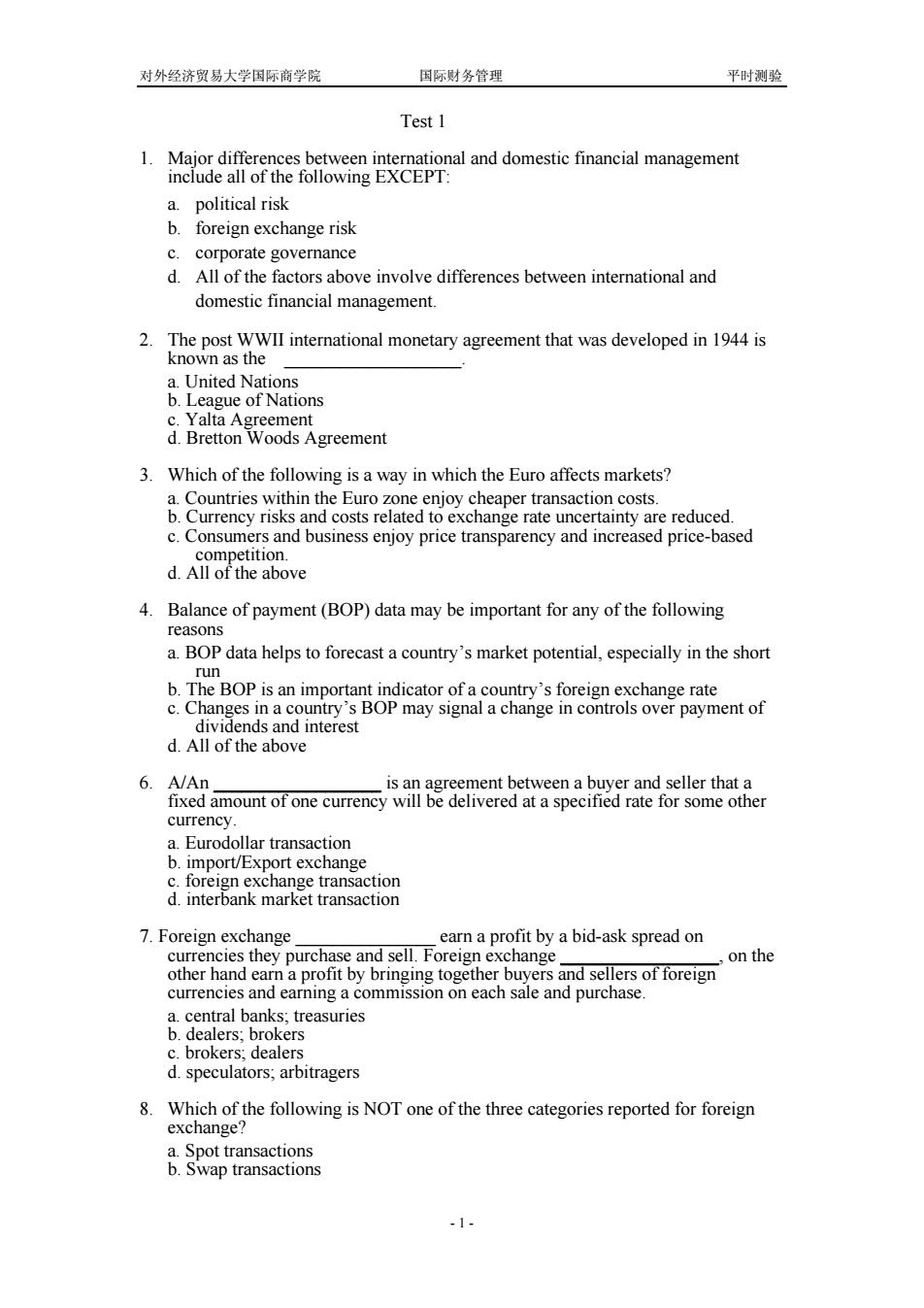正在加载图片...

对外经济贸易大学国际商学院 国际财务管理 平时测验 Test 1 1.Major differences between international and domestic financial management include all of the following EXCEPT: a.political risk b. foreign exchange risk C. corporate governance d.All of the factors above involve differences between international and domestic financial management. 2.The post WWII international monetary agreement that was developed in 1944 is known as the a.United Nations b.League of Nations c.Yalta Agreement d.Bretton Woods Agreement 3.Which of the following is a way in which the Euro affects markets? a.Countries within the Euro zone enjoy cheaper transaction costs. b.Currency risks and costs related to exchange rate uncertainty are reduced. c.Consumers and business enjoy price transparency and increased price-based competition. d.All of the above 4.Balance of payment(BOP)data may be important for any of the following reasons a.BOP data helps to forecast a country's market potential,especially in the short run b.The BOP is an important indicator of a country's foreign exchange rate c.Changes in a country's BOP may signal a change in controls over payment of dividends and interest d.All of the above 6.A/An is an agreement between a buyer and seller that a fixed amount of one currency will be delivered at a specified rate for some other currency. a.Eurodollar transaction b.import/Export exchange c.foreign exchange transaction d.interbank market transaction 7.Foreign exchange earn a profit by a bid-ask spread on currencies they purchase and sell.Foreign exchange on the other hand earn a profit by bringing together buyers and sellers of foreign currencies and earning a commission on each sale and purchase. a.central banks;treasuries b.dealers;brokers c.brokers;dealers d.speculators;arbitragers 8.Which of the following is NOT one of the three categories reported for foreign exchange? a.Spot transactions b.Swap transactions 1-对外经济贸易大学国际商学院 国际财务管理 平时测验 Test 1 1. Major differences between international and domestic financial management include all of the following EXCEPT: a. political risk b. foreign exchange risk c. corporate governance d. All of the factors above involve differences between international and domestic financial management. 2. The post WWII international monetary agreement that was developed in 1944 is known as the ___________________. a. United Nations b. League of Nations c. Yalta Agreement d. Bretton Woods Agreement 3. Which of the following is a way in which the Euro affects markets? a. Countries within the Euro zone enjoy cheaper transaction costs. b. Currency risks and costs related to exchange rate uncertainty are reduced. c. Consumers and business enjoy price transparency and increased price-based competition. d. All of the above 4. Balance of payment (BOP) data may be important for any of the following reasons a. BOP data helps to forecast a country’s market potential, especially in the short run b. The BOP is an important indicator of a country’s foreign exchange rate c. Changes in a country’s BOP may signal a change in controls over payment of dividends and interest d. All of the above 6. A/An __________________ is an agreement between a buyer and seller that a fixed amount of one currency will be delivered at a specified rate for some other currency. a. Eurodollar transaction b. import/Export exchange c. foreign exchange transaction d. interbank market transaction 7. Foreign exchange _______________ earn a profit by a bid-ask spread on currencies they purchase and sell. Foreign exchange _________________, on the other hand earn a profit by bringing together buyers and sellers of foreign currencies and earning a commission on each sale and purchase. a. central banks; treasuries b. dealers; brokers c. brokers; dealers d. speculators; arbitragers 8. Which of the following is NOT one of the three categories reported for foreign exchange? a. Spot transactions b. Swap transactions - 1 -